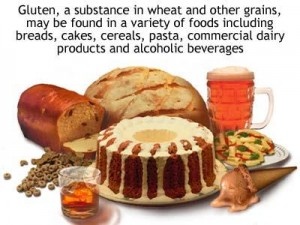Gluten Intolerance Symptoms: Signs of Celiac Disease and Gluten Sensitivity

It is important to know the gluten intolerance symptoms even if you do not have an allergy to this type of protein, as a good survival planner prepares for everything. If you have to get out of Dodge because of disaster, basic medical knowledge can help save a life. In the event the road back to civilization is a long one, being aware of these symptoms aids in the identification of gluten allergy in new members of the human race.
Celiac Disease
Celiac disease is the medical term associated with those who have an allergy to gluten and is a condition scientists believe to be genetic. A diagnosis usually occurs in late infancy when a baby’s diet begins to expand to include rice, cereal or oatmeal, though in some instances, a person with a gluten allergy may show no signs or symptoms.
Still, internal damage can occur because your body is not able to absorb or digest the nutrients provided in whole grains. Over time, if left undiagnosed and you continue to consume foods with gluten, you can become very ill, as this condition has no cure and the only way to treat it is to avoid this product.
Non-Celiac Disease
Non-celiac disease has the same gluten intolerance symptoms as celiac disease but the primary difference is that this medical condition does not cause damage to the intestines. However, the symptoms can be the same for either condition and vary in severity with each patient so if you are sensitive enough, an allergic reaction can still be fatal.
This condition is still fairly new to the medical community so not much information is available but doctors do know that patients with this condition also need to avoid foods that contain gluten.
Gluten Intolerance Symptoms and Signs
If you or someone you know has celiac or non-celiac disease, no symptoms may occur or you could experience a wide variety of medical issues, though some are more common than others. In either of these conditions, the gluten intolerance symptoms most likely to present themselves are stomach cramps or pain, bloating, gas, nausea, vomiting, diarrhea, fatigue, weakness, anemia, unexplained weight loss and a rash.
These conditions can lead to other problems if left untreated, if proper nutrition is an issue or if you are having a hard time coping with this disease. As a result, other gluten intolerance symptoms that may occur include:
- Bruising
- Depression
- Anxiety, panic attacks
- Red urine
- Foul smelling stool
- Muscle weakness, cramps or wasting
- Fluid retention
- Bone and joint pain
- Nerve damage
- Osteoporosis
These conditions may also bring about other gastric or digestive health problems, cause feelings of constant hunger and in some instances, lactose intolerance develops, which limits your diet even more.
Diagnosis
The signs and symptoms of celiac and non-celiac disease can also occur with other illnesses and a person with either of these conditions is unlikely to have every symptom so it is important that the diagnosis is correct. Traditionally, a doctor performs a blood test and if that is positive, then he or she schedules a biopsy of the small intestine to confirm the diagnosis.
If the world is in a chaotic mess, you cannot get these tests so a true diagnosis is impossible but if you or someone you know has these symptoms, you should eliminate gluten. In doing so, you can then make a fairly accurate assumption that celiac or non-celiac disease is present if the symptoms subside once you eliminate gluten from the diet.
Now that you are aware of the gluten intolerance symptoms, you have more life-saving skills to help others in a survival situation. It is also important to know that although these conditions usually present themselves in late infancy, they can also occur in adults, especially those who are on a gluten free diet or if grain products with gluten are unavailable and you do not eat them for a long time.
Return from Gluten Intolerance Symptoms to Survival Medicine
Print This Page





New! Comments
Have your say about what you just read! Leave me a comment in the box below.